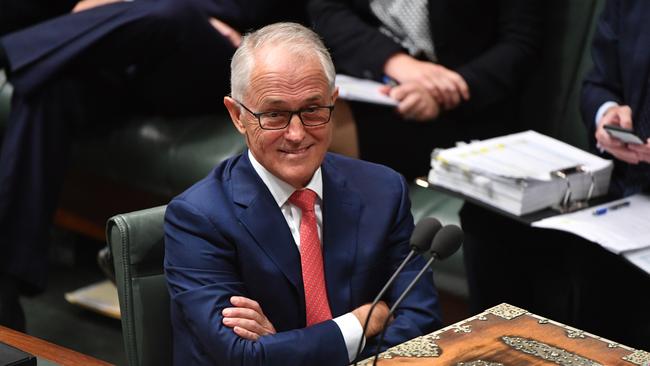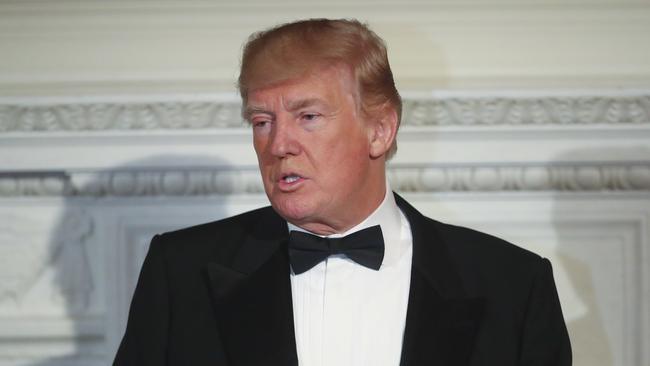Why tax cuts won’t help the economy
THERE’S a whiff of desperation from the Turnbull government. Why else would they plan so many tax cuts with a Budget that won’t return to surplus until 2020, writes Paul Syvret.
Rendezview
Don't miss out on the headlines from Rendezview. Followed categories will be added to My News.
WHEN the Turnbull government is likely defeated at the next election — if indeed it makes it that far without first imploding into a black hole of self-inflicted misadventure — it will hopefully take its blinkered neoliberal dogma to the grave with it.
Prime Minister Malcolm Turnbull returns to Canberra this week, fresh from his trickle-down tour of the United States, to preside over government benches best described as the shell shocked remains of a particularly prolonged artillery barrage.
Certainly there is a whiff of panicked desperation in the air.
How else can you explain reports the government is planning to rush forward billions of dollars in mooted personal income tax cuts, while still prosecuting the case for also giving our largest companies more tax relief?
The rush towards a personal tax cuts bribe has been couched as a “plan for political survival”, and one that could ostensibly be funded by a surge in Budget receipts underwritten by strong commodity prices.
In other words, when everything you touch turns to poo, and poll after poll indicates voters have had a gutful, what is there left to do but attempt to buy your way out of trouble?

As it stands we have a Budget not expected to return to surplus until 2020-21, and endless calls for spending restraint (unless of course that means finding a lazy $3.8 billion to throw at the defence manufacturing sector) in a climate where forecast tax receipts have tended to fall short of forecasts.
Now, however, it appears government strategists — in part galvanised by President Donald Trump’s $US1.5 trillion tax cut binge in the United States — have seized on a windfall to prosecute the case for a recurrent spending spree.
We have been here before.
Even without the Global Financial Crisis and the Rudd government’s stimulus measures of a decade ago, the federal Budget was already in strife due in no small part to waves of tax cuts and middle class welfare handouts during the Howard-Costello era.
As both the independent Parliamentary Budget Office and Treasury have noted, the Budget was in structural deficit prior to the GFC, with the PBO largely blaming the “cumulative effect of the successive personal income tax cuts granted between 2003-04 and 2008-09 (the latter period representing the “me too” tax cuts Rudd offered during the 2007 election campaign)”.
Add into this years of Howard era baby bonuses, superannuation sweeteners, Capital Gains Tax discounts, and largely un-means tested family payment boosts, all funded by boom time revenues.
The catch is of course, when the boom turns south, so does revenue, but the recurrent spending commitments remain.
Bear in mind too that all this stimulus was coming at a time when the economy was firing, wages were rising and we were near full employment.
In fact the demand side of the economy was already so strong that the Reserve Bank was busy lifting interest rates in an attempt to cool things down and keep inflation in check, at the same time the government was merrily priming the pumps.

Australian 2018 does not have the wages growth, inflation or bubbly economy of 2008, but then nor do we have quite as much black ink on the balance sheet.
Yet rather than tackle meaningful taxation reforms that address growing inequality, rein in speculative investment in negatively geared housing, or redress the growing vertical fiscal imbalance between the Commonwealth and the States, the government seems intent on another spendathon, based on revenue that may not always be there.
Put aside for a moment the nonsense that corporate tax cuts — which even Treasury modelling says will have a minimal impact on economic growth — will magically trickle down to increasingly casualised workers via higher wages.
As ACTU secretary Sally McManus points out, big businesses in Australia is enjoying record profits, while wage growth continues to languish at record low levels and work is becoming less secure.
Ignore, if you must, the fact that major corporates in the US — while doling out some public relations friendly one-off bonuses — are now embarking on an orgy of share buybacks.
According to research firm Birinyi Associates, big US companies have so far this year announced about $US6 billion in bonuses and rises for workers, while lavishing Wall Street with $US171 billion in share buybacks, which makes the alleged trickle look more like a slow drip.
Then put to one side the fact that while the Australian Taxation Office tells us that in 2015-16 more than one in three big Australian companies and multinationals operating here paid zero tax, Centrelink hounds clients with computer generated letters of demand that reverse the onus of proof.
Shelve the knowledge that as it stands the average tax paid by Australian companies is nowhere near the top statutory rate of 30, but actually closer to 17 per cent, yet still the Turnbull government wants to engage in a doomed race to the bottom.
At the very least, if you can ignore all of the above, just ask how we are actually going to pay for all this over the long term, and pay for it without turning our social safety net into the sort of the dystopian wasteland that prevails in the US.
Paul Syvret is the Assistant Editor of the Courier Mail. @PSyvret
Originally published as Why tax cuts won’t help the economy
